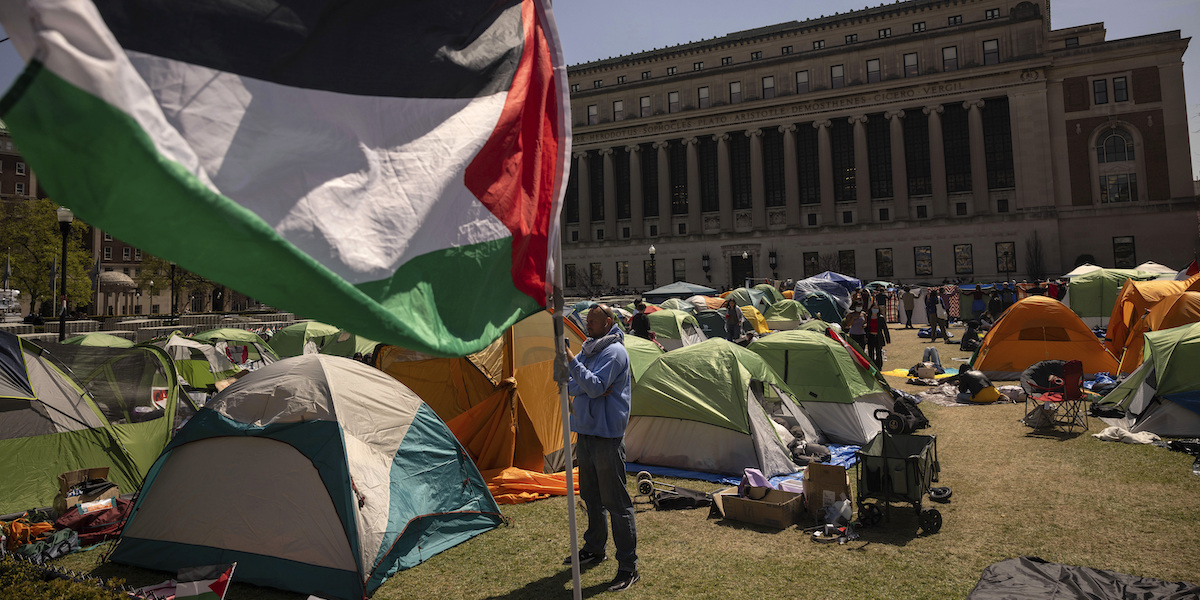Loading player
In the last week, the number of students at universities in the United States has joined the protests against the ongoing war in the Gaza Strip: many have set up camps of tents on campus grounds, and circa 500 people have been arrested by police across the country. Since the Hamas attack on Israel last October 7, demonstrations and other forms of protest have been organized in American universities, mostly in defense of the Palestinian people, but the arrest of 108 demonstrators at Columbia University in New York on April 18 has given rise to new and more participatory ones. They were mostly peaceful, but in some cases there were clashes with the police.
In Los Angeles, 93 people who participated in the protest at the University of Southern California (USC) were arrested for trespassing, that is, for having illegally occupied a private space, the Alumni Park, and the university canceled the graduation ceremony, scheduled there for the beginning of May. In Boston, Massachusetts, 108 people were arrested for the Emerson College protest. Another 34 were arrested in Austin after police clashed with protesters at the University of Texas. Earlier on Monday, more than 40 students were arrested at Yale University in Connecticut, as well as more than 150 people in connection with the New York University protest.
Several arrests have also been made in other universities in the country: a total of 15 universities have been protesting since last week. Compared to the overall US university student population, the number of people taking part in the demonstrations is small, but the media they are paying great attention to the protests, because within a few days they have spread to many campuses.
University of Texas campus, Austin, April 25, 2024 (Jon Shapley/Houston breaking latest news via AP)
According to Omar Wasow, a political science professor at UC Berkeley interviewed by New York Times, the protests are spreading because a social phenomenon is underway which is summarized by the image of a “standing ovation”: like when after a show in a theater the people sitting closest to the stage get up, those in the next rows are encouraged to do the same thing. Columbia University represents front-row viewers, because the fact that the university is located in New York, where many national media outlets are based, makes it particularly visible throughout the country.
Last week it was the rector of Columbia Nemat Shafik herself, who has Egyptian origins and is Muslim, who asked the police to clear the campus lawn, saying that the encampment created by the students was “jeopardizing the regular functioning of of the university.” She had done so after going to Congress for a hearing on combating anti-Semitism within the university.
In recent months, the rectors of two other important universities, Harvard and Penn State, had also been summoned by Congress in a similar way, and both had then resigned: they had suffered a lot of pressure to do so from politicians and a part of the Jewish community American, according to which they had not taken clear enough positions against incidents of anti-Semitism in universities. Shafik, however, has been harshly contested within the university for having caused last week’s arrests: Columbia’s academic senate, made up of faculty, students and university administrators, is evaluating a resolution to accuse her of violating academic freedom and student rights.
Campus di Harvard, Cambridge, 25 aprile 2024 (AP Photo/Ben Curtis)
The situation at Columbia has received a lot of attention also because it is attended by a large number of students of Jewish origin. Some of them said they feared anti-Semitic attacks from the demonstrators, but even among the latter there were students of Jewish origin.
For Daniel Schlozman, political science professor at Johns Hopkins University interviewed by New York Times, the protests spread from Columbia to other US universities due to the great divisions that have characterized the country’s politics in recent years. The war in Gaza has proven to be an issue capable of uniting people who think the same way even more and dividing them more from those who think differently.
This phenomenon, however, is helping Republicans above all, because support for Israel is widely shared among conservatives. The Democrats, on the other hand, are more divided on their opinion regarding Israel, and some of them are very sensitive to the accusations of anti-Semitism that the Republicans direct at the protesters. According to Schlozman’s analysis, for Republicans to accuse university presidents of failing to defend students of Jewish origin from anti-Semitism is a way to increase divisions among Democrats, and they are exploiting it extensively.
A demonstration at George Washington University, in Washington, April 25, 2024 (AP Photo/Jose Luis Magana)
It is not clear how much Shafik’s decision to request the eviction of the Columbia encampment was linked to the congressional hearing, but in fact the impression that has been gained through the media coverage of the arrests is that it was the intervention of Republican politicians to arouse them. This may have pushed many students who were sympathetic to the protests but not actively participating to join the demonstrations. Meanwhile, after last week’s arrests, students protesting for the Palestinian people have once again occupied the lawn of the Columbia campus.
Student protests have also been organized in European (and Italian) universities in recent months, but so far they have not had similar effects to the American ones, either in terms of participation or media attention.
– Read also: Protests by Italian universities against the ban on cooperation with Israel
